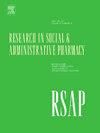药师主导的干预措施在改善痛风结果方面的有效性:一项系统综述。
IF 2.8
3区 医学
Q1 PUBLIC, ENVIRONMENTAL & OCCUPATIONAL HEALTH
Research in Social & Administrative Pharmacy
Pub Date : 2025-06-27
DOI:10.1016/j.sapharm.2025.06.108
引用次数: 0
摘要
背景:药剂师是医疗保健团队的核心成员,提供基本的支持,除了配药。他们在管理和教育患者,特别是慢性病患者方面发挥着关键作用。尽管许多研究报告了药剂师参与痛风患者的护理,但总体证据仍然有限,并且没有很好地定义。目的:本系统综述旨在评估药师主导的干预措施对改善痛风患者痛风结局的影响,特别关注血清尿酸水平、药物依从性和患者教育。方法:综合检索PubMed、Ovid Embase、Cochrane (library) central等多个电子数据库,检索截至2025年4月发表的相关研究。本综述纳入的研究包括随机对照试验(rct)和非随机对照试验(non- rct),包括评估药师主导的痛风管理干预措施的前后研究和队列设计。关注的结果是血清尿酸水平的降低、痛风发作的预防、绝对血清尿酸的降低、达到目标血清尿酸水平所需的剂量、患者教育的改善和门诊就诊频率的提高。使用robins -2工具评估rct的偏倚风险,而使用ROBINS-I工具评估非随机研究。结果:本综述纳入了5项研究,共涉及1805名痛风患者。在这些研究中,药剂师提供干预措施,如提供干预措施;包括加强患者教育或单独或与其他医疗团队成员合作提供药物护理。两项研究为随机对照试验,三项为非随机对照试验。药剂师主导的干预有助于达到目标血清尿酸水平,确定达到目标水平所需的降尿酸治疗的适当剂量,提高依从性,减少痛风发作。与非随机研究相比,随机试验的风险较低。结论:药师参与痛风管理可显著提高痛风患者的疾病控制水平,改善患者的整体生活质量。进一步的研究是必要的,以确定药剂师主导的干预措施的最有效的组成部分,并评估其对痛风结果的影响。本文章由计算机程序翻译,如有差异,请以英文原文为准。
Effectiveness of pharmacist-led interventions in improving gout outcomes: A systematic review
Background
Pharmacists are core members of the healthcare team, offering essential support beyond dispensing of medications. They play a crucial role in managing and educating patients, particularly those with chronic diseases. Although numerous studies have reported the involvement of pharmacists in the care of people living with gout, the overall evidence remains limited and is not well defined.
Objectives
This systematic review aims to evaluate the impact of pharmacist-led interventions in improving gout outcomes in people living with gout, specifically focusing on serum uric acid levels, medication adherence, and patient education.
Methods
A comprehensive search was conducted on multiple electronic databases including PubMed, Ovid Embase and Cochrane (library) central to identify relevant studies published up to April 2025. The studies eligible for this review included randomized controlled trials (RCTs), and non-randomized studies (non-RCTs), including pre-post studies and cohort designs that assessed pharmacist-led interventions in the management of gout. Outcomes of interest were reductions in serum uric acid levels, prevention of gout flares, absolute serum uric acid reductions, required dosage to achieve target serum uric acid level, improvements in patient education and frequency of clinic visits. The risk of bias for RCTs was assessed by utilizing the ROB-2 tool, while non-randomized studies were assessed with the ROBINS-I tool.
Results
Five studies involving a total of 1805 people living with gout were included in this review. In these studies, pharmacists delivered interventions such as provided interventions; enhancing patient education or providing pharmaceutical care either alone or in collaboration with other healthcare team members were included. Two studies were RCTs, while three were non-RCTs. Pharmacist-led interventions contributed to achieving target serum uric acid levels, determining appropriate the dose of urate lowering therapy needed to attain target levels, improving adherence, and reducing gout flares. The randomized trials were found to have lower risk compared to non-randomized studies.
Conclusion
The findings suggested that pharmacist involvement in gout management can considerably enhance disease control and improve the overall quality of life for patients. Further research is warranted to identify the most effective components of pharmacist-led interventions and to evaluate their effect on gout outcomes.
求助全文
通过发布文献求助,成功后即可免费获取论文全文。
去求助
来源期刊

Research in Social & Administrative Pharmacy
PUBLIC, ENVIRONMENTAL & OCCUPATIONAL HEALTH-
CiteScore
7.20
自引率
10.30%
发文量
225
审稿时长
47 days
期刊介绍:
Research in Social and Administrative Pharmacy (RSAP) is a quarterly publication featuring original scientific reports and comprehensive review articles in the social and administrative pharmaceutical sciences. Topics of interest include outcomes evaluation of products, programs, or services; pharmacoepidemiology; medication adherence; direct-to-consumer advertising of prescription medications; disease state management; health systems reform; drug marketing; medication distribution systems such as e-prescribing; web-based pharmaceutical/medical services; drug commerce and re-importation; and health professions workforce issues.
 求助内容:
求助内容: 应助结果提醒方式:
应助结果提醒方式:


